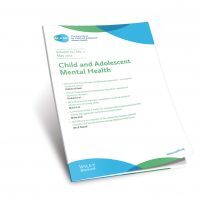Some highlights from our three journals JCPP, CAMH, and JCPP Advances. Each one of the posts below provides a link to read, and download the full paper.
Feature Papers
-

The relationship between cognitive and affective control and adolescent mental health
Open Access paper from JCPP Advances – ‘This study examines whether adolescent mental health is associated with affective control, the application of cognitive control in affective contexts, which shows more protracted development than cognitive control.’ Savannah Minihan et al.
Read more -

Comparing findings from the random-intercept cross-lagged panel model and the monozygotic twin difference cross-lagged panel model: Maladaptive parenting and offspring emotional and behavioural problems
Open Access paper from JCPP Advances – ‘We examine associations between maladaptive parenting and child emotional and behavioural problems in identical twins aged 9, 12 and 16.’ Marie-Louise J. Kullberg (pic) et al.
Read more -

Where you live matters: visualizing environmental effects on reading attainment
Paper from the JCPP – ‘This study investigates the extent to which SES and geographical location interact to moderate the genetic and environmental components of reading attainment.’ Jeffrey A. Shero (pic) et al.
Read more -

Narrative Matters: Wasting away and fed up – dietary battles in history
Paper from the CAMH journal – ‘Histories of anorexia nervosa (AN), mostly written since the 1970s, have a standard narrative. The story is of largely Eurocentric self-starvation in adolescent girls in response to sociocultural pressures on women who are trapped in disempowering patriarchal systems.’ Jane Whittaker
Read more -

Diagnostic certainty during in-person and telehealth autism evaluations
Open Access paper from JCPP Advances – ‘Differences emerged in the frequency of diagnoses evaluated and made and diagnostic certainty for evaluations conducted via telehealth during the pandemic compared to in person before the pandemic, which likely impacted patients and reflect real-word challenges.’ Natasha N. Ludwig (pic) et al.
Read more -

Short Research Article: Opening a new CAMHS day hospital – does it affect inpatient admissions and does it help at all?
Paper from the CAMH journal – ‘This study’s primary aims were to examine the impact of a new Child and Adolescent Mental Health Service (CAMHS) day hospital on referrals and admissions to the associated CAMHS in-patient unit.’ Sannie John and Dermot Cohen
Read more -

Practitioner Review: Effectiveness and mechanisms of change in participatory arts-based programmes for promoting youth mental health and well-being – a systematic review
Open Access JCPP paper – ‘There is good evidence that there are therapeutic processes in PAB programmes. There is a need for more transdisciplinary work to increase understanding of context–mechanism–outcome pathways, including the role played by different art stimuli and practices.’ Emma Williams (pic) et al.
Read more -

The relationship between dissociation and panic symptoms in adolescence and the exploration of potential mediators
Open Access paper from JCPP Advances – ‘In the present study, we investigated the longitudinal relationship between dissociative experiences and panic, as well as the potential mediating roles of emotion regulation strategies, alexithymia, and cognitive appraisals of dissociation.’ Lottie Shipp (pic) et al.
Read more -

START NOW: a cognitive behavioral skills training for adolescent girls with conduct or oppositional defiant disorder – a randomized clinical trial
Open Access paper from the JCPP – ‘Here, we aimed at confirming the efficacy of START NOW, a cognitive-behavioral, dialectical behavior therapy-oriented skills training program aiming to enhance emotion regulation skills, interpersonal and psychosocial adjustment, adapted for female adolescents with CD or ODD.’ Christina Stadler (pic) et al.
Read more -

Subtyping at-risk adolescents for predicting response toward insomnia prevention program
Open Access JCPP paper – ‘Adolescents at risk for insomnia can be classified into different subgroups according to their psychological profiles, which were associated with differential responses to the insomnia prevention program.’ Si-Jing Chen et al.
Read more